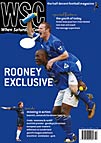 Squads are now so vast that players can sink to the bottom and never come up again. Matthew Hall goes in search of Mark Bosnich
Squads are now so vast that players can sink to the bottom and never come up again. Matthew Hall goes in search of Mark Bosnich
Three years ago, Mark Bosnich had it all. He had turned down Juventus to rejoin his beloved Manchester United, the club he spent three seasons with as a teenager a decade earlier, as successor to Peter Schmeichel. During the same summer, after a night that ended in a police cell, he had remarried. Happy at work and happy at home, the future was bright. Three years later, the sunglasses are well and truly off, most likely replaced by pyjamas, slippers and a blanket. Mark Bosnich doesn’t get out much these days, and in that relatively short space of time, Bosnich has felt the wrath of Sir Alex Ferguson, then his new wife and now Claudio Ranieri.
Bosnich joined Chelsea in January 2001, after being publicly humiliated by Ferguson. The name Massimo Taibi, in retrospect perhaps the first sign Ferguson was losing his previous sharp eye for players, still sends shivers down the spines of United fans. But even though he looked a world-beater by comparison, Bosnich was unable to establish himself as the long-term No 1 at Old Trafford.
The reasons for Ferguson’s fall-out with Bosnich (besides the manager thinking the Australian was rubbish) are unknown. Conjecture suggested a vendetta going back to Bozza’s decision to return to England and join Aston Villa, rather than United, in 1992. Certainly Ferguson was unlikely to be too chuffed at the jail episode. Another theory is that Bosnich was caught in a power struggle between Ferguson and Martin Edwards. Bosnich was an “Edwards signing”. Ferguson had wanted Fabien Barthez all along, but Edwards was not prepared to pay when Bozza was free.
Whatever the truth, Bosnich’s pregnant wife felt so strongly about how the situation was affecting her husband that she packed her bags and left. The couple have yet to reconcile, even with the baby now born. Bosnich signed a three-and-a-half year deal with Chelsea, and was initially earmarked as first-choice keeper. The club seemed suited to Bosnich: brash, ambitious and located in lively London.
“We are delighted he has chosen Chelsea,” said managing director Colin Hutchinson at the time. “He wants to play for Chelsea. He is hungry to win things and put the past behind him.” But after 18 months, Bozza has played just five league games. A year ago, although Bosnich had started most of the pre-season friendlies, Ed De Goey was in goal for the season’s opener. Bosnich finally got a run in the ill-fated UEFA Cup excursion to Israel, and played well for a few games, but was injured in a 0-0 draw at Everton and lost his place to Carlo Cudicini. The Italian has never looked back. Bosnich has not known where to look.
At the time, Bosnich was circumspect about his plight. After learning he’d been dropped from the Australia squad to face Uruguay in the World Cup qualifiers, Bosnich was big on team spirit: “Any footballer in the world who is not playing is disappointed,” he told me. “You can either sit around and feel sorry for yourself or you can work twice as hard and get behind the team.”
“My future is with Chelsea but in terms of selection it is up to the manager,” he added. “The situation is quite simple. On the football side, the manager is the biggest person at the football club. When you are playing with big clubs they can sign the best players around so you have to keep on your toes and do the right thing.”
It’s not known what Bosnich thinks of his continuing inactivity. In short, he doesn’t talk to the media these days besides the odd forelock tug about being “happy” in London. These comments are not without strategic importance. Chelsea, stricken with debt, need to cut costs. On a wage of £40,000 a week, an unused Bosnich is a cost waiting to be cut.
Chelsea have made it clear Bosnich is free to go, but no club is interested in picking up such a high salary (£20,000 a week is a more “realistic” wage, according to industry insiders). The financial situation is the key. With almost two years left on his contract, Bosnich has a choice: sit on his bum, count the cash and watch from the stands, hoping Ranieri gets the flick and a new manager rates him above Cudicini and De Goey. Or swallow his pride, slash his salary by 50 per cent and get a game somewhere, anywhere.
“Of course I miss playing,” he said a year ago, not realising 12 months later he would still struggle to pull on a shirt. “I enjoy my football and my work. It’s easy to keep positive because all you have to do is turn on the TV and watch the news. That makes you realise how lucky you are.”
From WSC 190 December 2002. What was happening this month